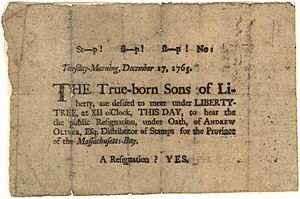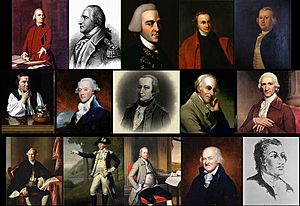Sons of Liberty facts for kids
The Sons of Liberty were a group of American colonists in Boston during the time of the American Revolution. They were led by important figures like Samuel Adams, James Otis, and Paul Revere. Other well-known members included Benedict Arnold and Patrick Henry.
The Sons of Liberty strongly supported the rights of people living in the colonies. This often meant they disagreed with the rules set by the British. Some people thought the Sons of Liberty were too aggressive. This group was a big part of events like the Boston Massacre and the Boston Tea Party.
Contents
How the Sons of Liberty Started
In 1765, the British government needed money. They had 10,000 soldiers and officers living in the colonies. Britain wanted the colonists to help pay for them. So, the British passed new taxes on the colonists. Many colonists refused to pay these taxes. They argued that they should not be taxed without having a say in the British government. This idea became famous as "No Taxation without Representation."
The British Parliament believed it had the right to rule the colonies, even though colonists had no representatives in Parliament. The most upsetting tax was the Stamp Act of 1765. This tax caused a huge wave of anger. People protested through new laws (starting in Virginia), public demonstrations, and threats.
The Sons of Liberty group grew very quickly. It started in different colonies on its own. In August 1765, the group officially began in Boston, Massachusetts. By November 6, a committee was set up in New York to communicate with other colonies. In December, groups in New York and Connecticut formed an alliance. By March, groups in Providence, New Hampshire, and Newport, Rhode Island were connected. Sons of Liberty groups also appeared in New Jersey, Maryland, and Virginia in March.
In Boston, the Sons of Liberty showed their anger towards the local stamp distributor, Andrew Oliver. They burned a dummy of him in the streets. When he didn't quit his job, they burned down his office building. Even after he resigned, they nearly destroyed the home of his friend, Lieutenant Governor Thomas Hutchinson. People believe the Sons of Liberty did these things to get more ordinary people involved in protesting against the British authorities. Their actions made many stamp distributors resign because they were scared.
The Boston Sons of Liberty were also key in planning and carrying out the famous Boston Tea Party in 1773. This was a protest against the Tea Act.
As the American Revolution began, many former Sons of Liberty members joined more official groups. One such group was the Committee of Safety.
The Sons of Liberty made a punishment called "tar and feathering" well-known. They used it to embarrass and punish government officials starting in 1767. This method was also used against British Loyalists during the American Revolution. Sailors had used this punishment for a long time to punish their shipmates.
Sons of Liberty in New York
In December 1773, a new group in New York City, also calling themselves the Sons of Liberty, shared a statement. It was called the Association of the Sons of Liberty in New York. This statement clearly said they were against the Tea Act. They declared that anyone who helped carry out the act was "an enemy to the liberties of America." They also said they would not do business with or hire anyone who broke these rules.
After the American Revolutionary War ended, Isaac Sears, Marinus Willet, and John Lamb restarted the Sons of Liberty in New York City. In March 1784, they gathered a large crowd. This crowd demanded that any remaining Loyalists leave the state by May 1. The Sons of Liberty won enough seats in the New York assembly elections in December 1784. This allowed them to pass tough laws against Loyalists. They even called for taking away the Loyalists' property, which went against the Treaty of Paris (1783). Alexander Hamilton defended the Loyalists, saying the treaty was more important than these new laws.
Sons of Liberty Flags
In 1767, the Sons of Liberty started using a flag called the rebellious stripes flag. It had nine vertical stripes, with four white and five red ones.
Another flag with 13 horizontal red and white stripes was used by Commodore Esek Hopkins. He was the Commander-in-Chief of the Continental Navy. American merchant ships also used this flag during the war. This flag was also linked to the Sons of Liberty. Red and white were common colors for their flags, but they sometimes used other colors like green and white or yellow and white.
Important Sons of Liberty Members
From Boston
- Samuel Adams – a political writer and tax collector. He was a cousin of John Adams and helped start the Sons of Liberty.
- Benjamin Church (physician) – the first Surgeon-General of the United States Army. He was later banished from Massachusetts.
- Benjamin Edes – a journalist and publisher of the Boston Gazette newspaper.
- Benjamin Kent – Attorney General.
- John Hancock – a merchant and smuggler.
- James Otis – a lawyer from Massachusetts.
- Paul Revere – a silversmith and famous rider.
- James Swan – a financier.
- Isaiah Thomas – a printer. He was the first person to read the Declaration of Independence in Massachusetts.
- Joseph Warren – a doctor and soldier.
- Thomas Young – a doctor.
From New York
- Joseph Allicocke – one of the leaders, possibly of African heritage.
- John Lamb – a trader.
- Alexander McDougall – a captain of privateer ships.
- Hercules Mulligan – a clothing seller and a spy for George Washington during the war. He was a friend of Alexander Hamilton.
- Isaac Sears – a captain of privateer ships.
- Haym Salomon – a financial broker in New York and Philadelphia.
- Marinus Willett – a militia officer and cabinet maker.
From Other Colonies
- Benedict Arnold – a businessman who became a General in the Continental Army, then later joined the British Army.
- Timothy Bigelow – a blacksmith from Worcester, Massachusetts.
- John Brown – a business leader from Providence, Rhode Island.
- Samuel Chase – a signer of the Declaration of Independence.
- John Crane – a carpenter and a colonel in the army from Braintree, Massachusetts.
- William Ellery – a signer of the Declaration of Independence.
- Christopher Gadsden – a merchant from Charleston, South Carolina.
- Patrick Henry – a lawyer from Virginia.
- Jedediah Huntington – a General in the Continental Army.
- William Paca – a signer of the Declaration of Independence.
- Charles Willson Peale – a portrait painter and saddle maker from Annapolis, Maryland.
- Matthew Phripp – a merchant and leader of the Norfolk committee of safety from Norfolk, Virginia.
- Benjamin Rush – a physician from Philadelphia.
- Charles Thomson – a tutor and secretary from Philadelphia.
- William Williams – a signer of the Declaration of Independence.
Later Groups Using the Name
Over time, some small secret groups also called themselves "Sons of Liberty." They usually didn't leave many records. For example, in the early 1800s, Bennington, Vermont had a Sons of Liberty group.
The Improved Order of Red Men, started in 1834, claimed to be connected to the original Sons of Liberty. They noted that the Sons of Liberty at the Boston Tea Party dressed up like "Indians."
The name was also used during the American Civil War. By 1864, a group called the Knights of the Golden Circle created a branch called the Order of the Sons of Liberty. Both groups faced legal action from the government in 1864 for treason, especially in Indiana.
See also
 In Spanish: Hijos de la Libertad para niños
In Spanish: Hijos de la Libertad para niños
 | Mary Eliza Mahoney |
 | Susie King Taylor |
 | Ida Gray |
 | Eliza Ann Grier |



